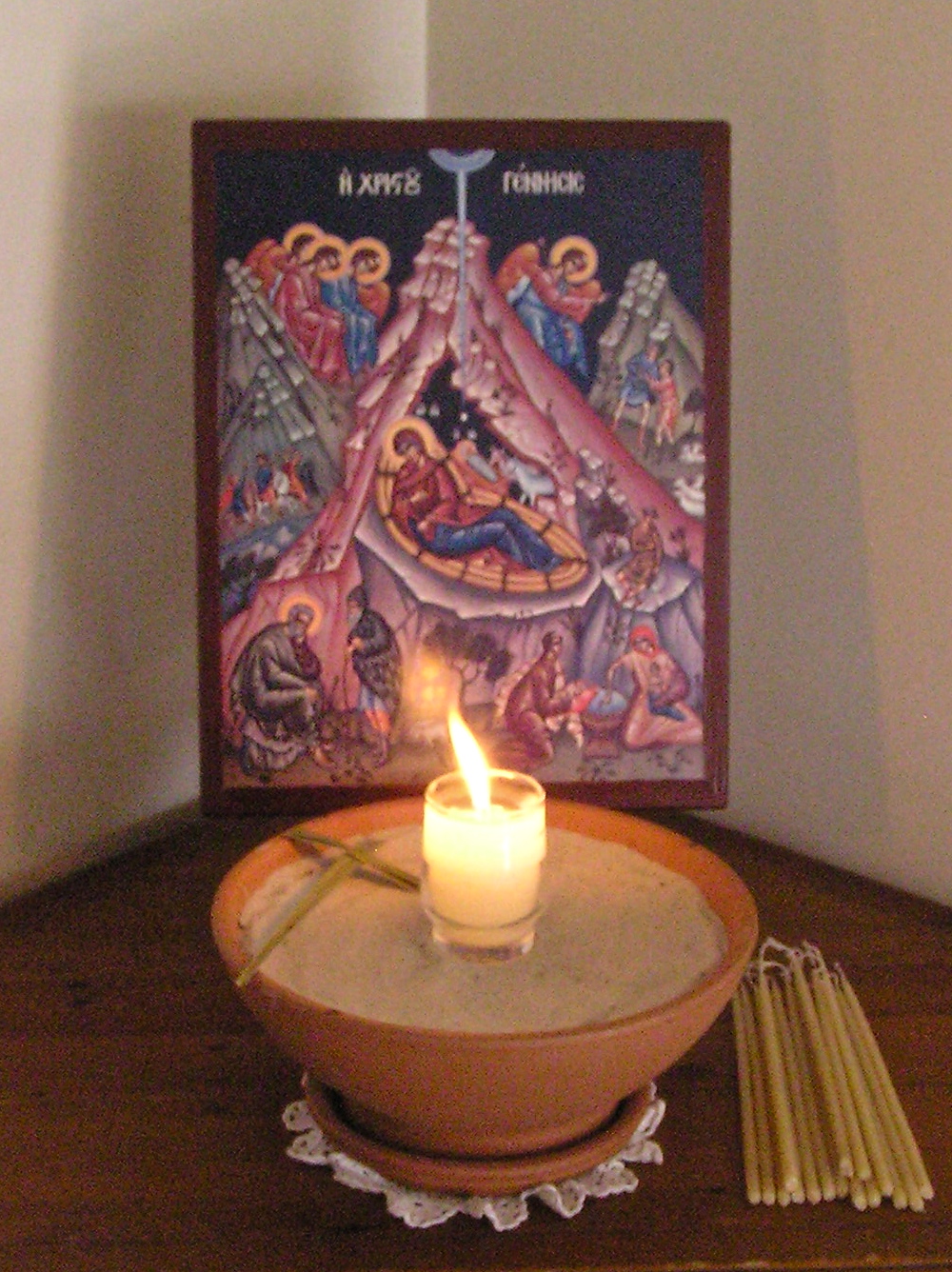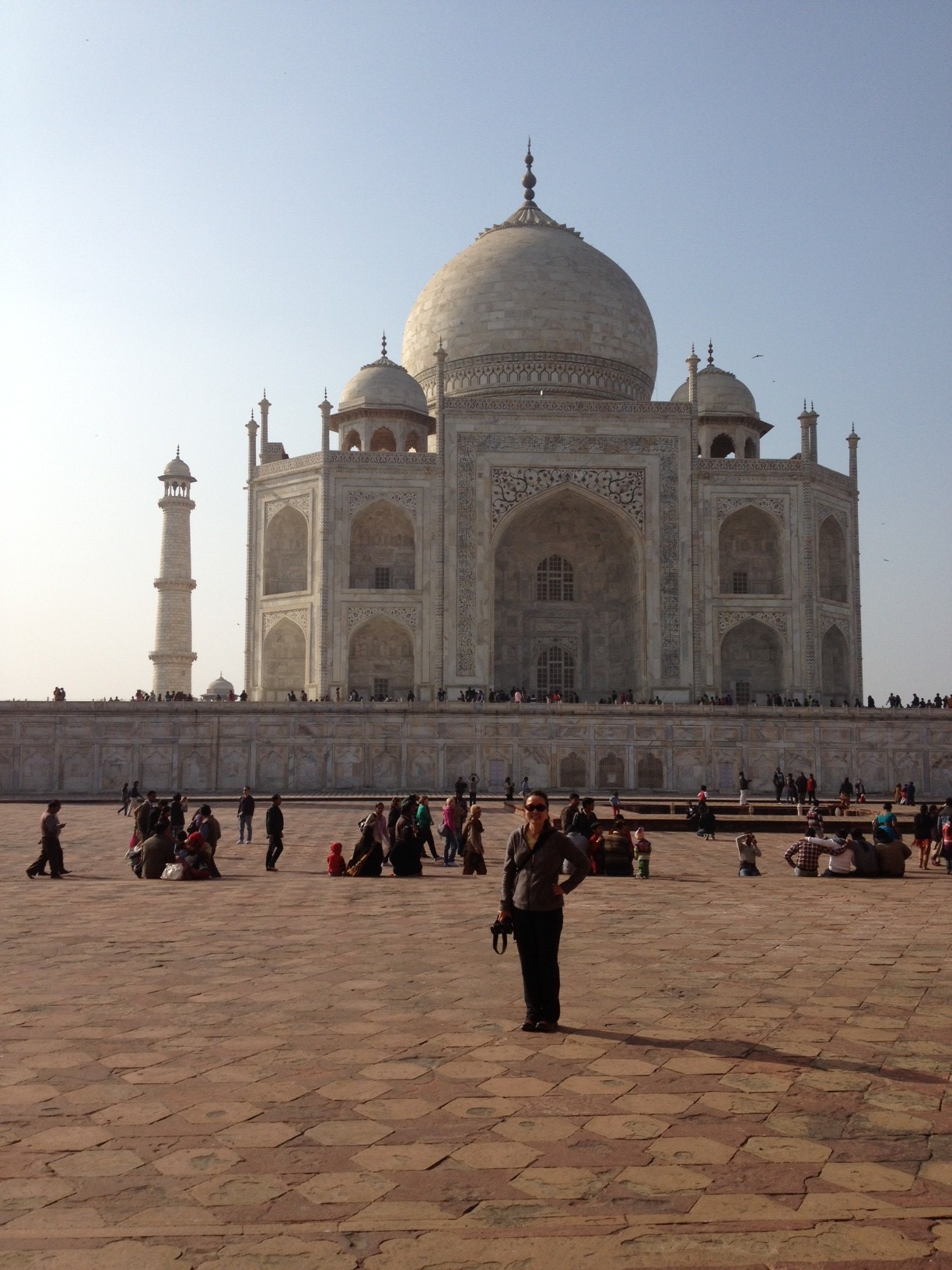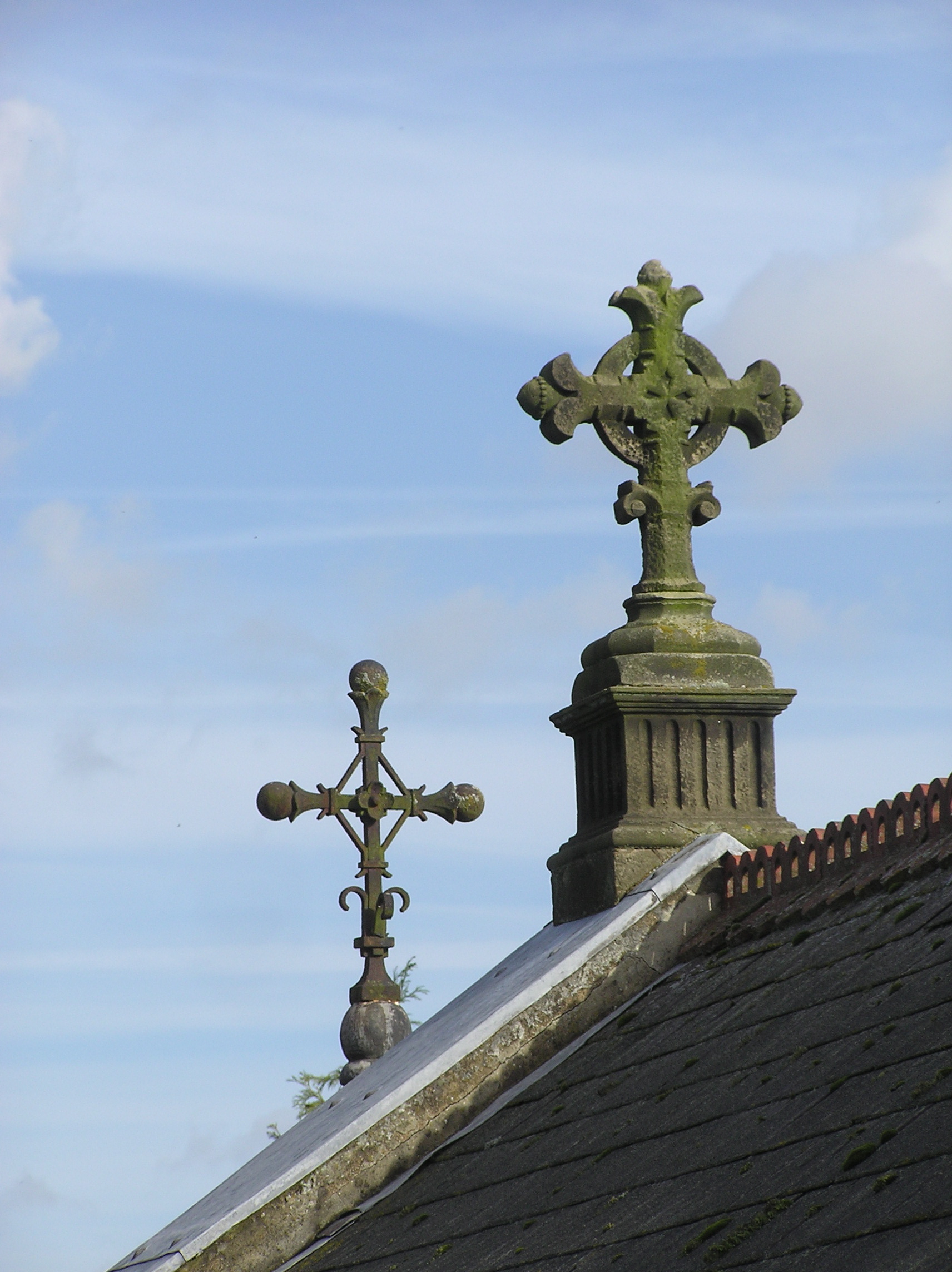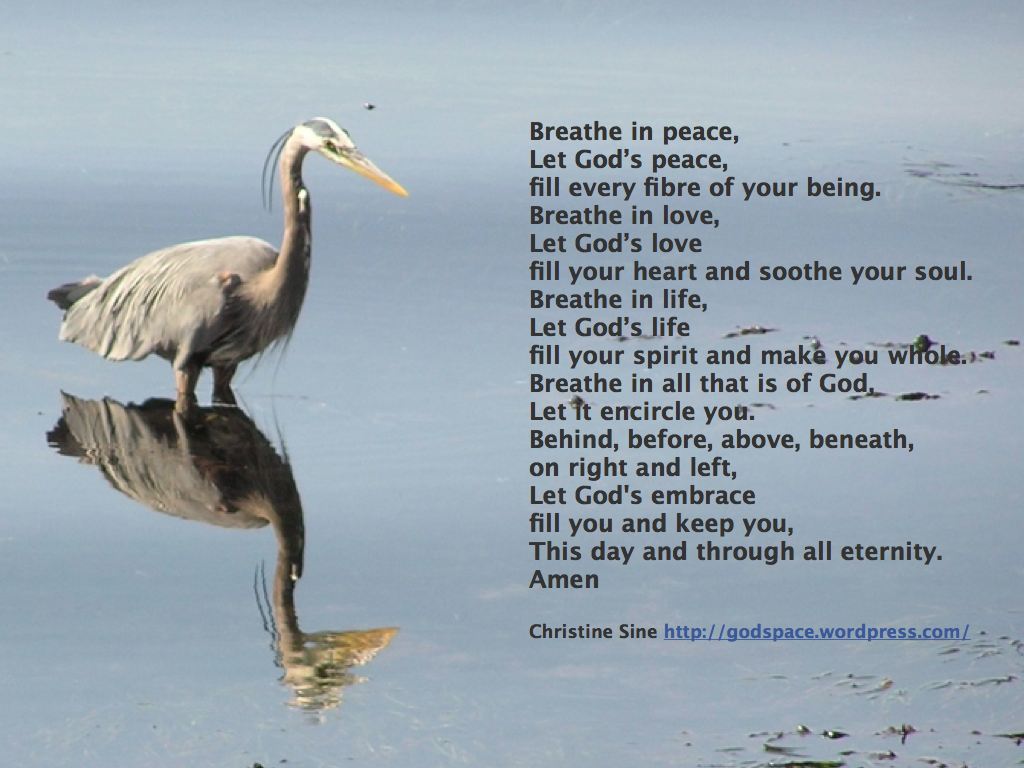This week’s prayers from the Light for the Journey Facebook page
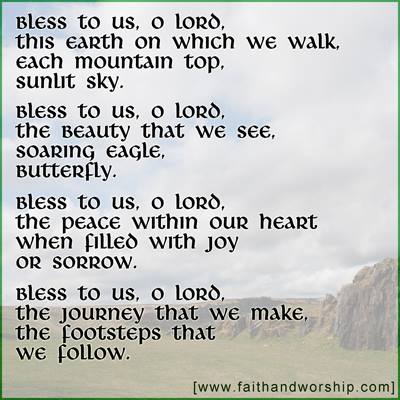
Pastor Dave Hodson reshaped one of this week’s prayers, to be a “Trinity Prayer”, ala Celtic traditions…
I love it
Heavenly Father,
God of seed and growth and harvest,
Creator of all that grows and all that sustains,
give us we pray our daily bread,
enough for our own needs
and an abundance for all good works.
Lord and Savior, Jesus Christ,
You broke the bread for the multitudes,
and broke bread with your disciples.
Give us also we pray, the bread of life,
that we shall have a care to feed the hungry,
and to seek for peace and justice in the world.
Guiding and Empowering Spirit,
You bring to mind all that Jesus taught,
and you give us strength to walk in his steps.
Help us to remember and to know in our hearts,
that you are our life today and every day;
Holy God; Holy One; Holy Three…
Our hearts are restless, until we rest in you.
You are the food we need, now and for ever.
Amen
And here is the prayer which inspired him which was in itself inspired by the New Zealand Prayer Book
God of seed and growth and harvest,
Creator of all that grows and all that sustains,
give us we pray our daily bread,
enough for our own needs
and an abundance for all good works.
Give us also we pray, the bread of life,
that we shall have a care to feed the hungry,
and to seek for peace and justice in the world.
Help us Lord to remember and to know in our hearts,
that you are our life today and every day;
you are the food we need, now and for ever.
Amen
Christine Sine https://godspacelight.com/
To know you, Lord
what more could we desire?
To know your love,
hear your call,
feel your touch,
understand your suffering,
follow where you have walked
into resurrection life.
To know you, Lord
what more could we desire?
To run the race,
eyes focused,
spirit filled,
stumbling but rising up,
heading toward the glorious sight
of resurrection life.
God shine your light today
In places blanketed with darkness.
God unfold your love today,
In places where hate destroys.
God show your life today,
In places where death holds sway.
God reveal yourself
Overcome evil with good,
Conquer death wit life,
Dispel hate with love.
Through Jesus Christ
Bring renewal, restoration and peace.
Christine Sine https://godspacelight.com/
Lord Jesus Christ grant us this day ,
Such delight in following you,
That we may know
the wonder of your love,
the beauty of your holiness,
the joy of your presence.
Christine Sine https://godspacelight.com/
Today’s post is by Kimberlee Conway Ireton, author of The Circle of Seasons: Meeting God in the Church Year.
I’m driving on Westlake toward the south end of Lake Union, where I’m supposed to drop off my son for his sailing lesson. The lesson starts in five minutes, and he’s going to be late. I’m in the left lane, trying to get past a semi, but there’s road construction and the street narrows to one lane just ahead.
I manage to get in front of the semi, but when I look over my shoulder to see if there’s space for me to merge, the semi driver steps on his accelerator. I’m forced to slip in behind him. “Jerk!” I say out loud.
“Who’s a jerk, Mama?” my daughter asks from the back of the van.
I take a deep breath. One of the practices I’ve embraced since beginning my year of prayer is to bless those who annoy me. This occurs most often and most viscerally when I’m driving. After more than two decades of habitual screeching at the morons with whom I share the road, I have a deep groove in my brain that sends words like idiot and jerk and something that starts with A and ends in hole streaming out of my mouth when I’m sitting behind a steering wheel.
But recently, I’ve begun to realize something. Jesus, about whom I’m all gaga right now, this God-man I say I follow and want to be like—well, it’s dawning on me that he wouldn’t yell names at semi drivers who cut him off. He wouldn’t mutter miscreant or cretin under his breath, however smart such words might make him feel. No, Jesus would see that other driver as a child of God, created in the divine image, beloved.
This is a very frustrating realization. There’s something morally satisfying about feeling myself slighted or mistreated when I’m driving. It feels like I have a right to yell about it. And maybe I do. But as I draw nearer to Jesus, I find the yelling isn’t as satisfying as it used to be. As soon as the nasty name is out of my mouth, I feel myself convicted: That’s My child you’re calling a jerk.
And I recall the Sermon on the Mount, where Jesus is very clear that name-calling is not okay:
Whoever says, ‘You fool!’ will be liable to the fires of hell.”
Ouch.
And so I’m taking a small step toward no longer calling people fools (or other choice words). When someone annoys me while I’m driving, I pray a blessing over them—after I call them a name, of course. I’d like to get to a place where blessing is my knee-jerk response to irritation, but I’ve a long way to go in that department.
Truth is, half the time when I pray those blessings, I feel a bit self-righteous, like I’m so great that I’m praying for those who annoy me. This used to stop me from praying—I don’t want to be a hypocrite. But then I realized that not praying is exactly what the enemy would want—whatever it takes to shut me up, even if that’s a realization of my own hypocrisy.
So I pray the blessing anyway, even though I’m still annoyed. I pray the blessing even though there’s part of me that feels smug for doing so. I pray the blessing even though I don’t wholly mean it.
Because I want to wholly mean it. I want to get to a place where praying a blessing over those who annoy me is my first response. Right now, I still have to go through the name-calling to get to the blessing, but I’m trusting that with time and practice, the distance between annoyance and blessing will shrink, and that one day, I’ll be able to smile when the semi driver cuts me off and say an instantaneous and heartfelt blessing over him.
“Mama?” Jane asks again. “Who’s a jerk?”
“Oh, the guy driving that truck cut me off,” I tell her. “It’s really not a big deal.”
Then I launch into my blessing, “God, please bless the driver of this truck in front of us. Please give him peace as he drives. Please keep him safe so that he reaches his destination on time and without harm. And please let him be a blessing to other drivers on the road.”
“Amen,” Jane says.
Amen, indeed.
Jesus says “Love your enemies and pray for those who persecute you.” For those of you who, like me, aren’t yet able to do this, let me invite you to begin by simply praying for those who annoy you, whether that’s another driver on the road, a blogger with whom you disagree (anyone praying for me right now?), or a colleague who consistently rubs you the wrong way. Let’s use our annoyance and irritation as a call to prayer and so transform it into another path to the heart of God.
The response to my post Enhance Your Spiritual Resilience – Five Practices that Make a Difference made me realize that this is a topic that needs to be fleshed out in more detail. This post is designed to help flesh out some of the practices. It draws from my book Godspace which specifically addresses some of these issues.
According to Christian anthropologist Paul Hiebert there are two types of rituals, habits or practices we need in our lives, what he calls rituals of restoration and rituals of transformation.
Rituals of restoration are the most common. These are the practices that restore our faith in the beliefs that order our lives. They also connect us to and anchor us in the religious communities in which these beliefs are expressed. Restorative practices are highly structured & do not change from day to day or year to year. They reaffirm our sense of order & meaning in the universe, our community & our own lives. Most importantly, they intentionally connect our daily activities to the life, death & resurrection of Christ.
Possibilities include a rhythm of prayer that reaffirms what we believe, sabbath practices, weekly church gathering, taking communion, following the liturgical calendar and the use of liturgical symbols like the sign of the cross, candles, and incense. I even find that writing prayers for Facebook each morning and preparing my blog posts is a stabilizing and restorative ritual.
For me it has been the establishment of rhythms rather than the actual practices that are important. The practices may change but I love to have a regular rhythm to the day, week and year. In fact the breaking of this rhythm is one thing I find destabilizing. Praying each day is an essential part of my faith practice but what those prayers look like can change from day to day and week to week. At the moment I am using The New Zealand Prayer Book each day. It is available on line here. I have just downloaded the morning and evening prayer sections onto my kindle for when I travel, though I much prefer having a physical book in my hands each morning when possible.
Rituals of transformation are characterized by a high degree of creativity & have little repetitive structure. Their goal is to cut through the established way of doing things and restore a measure of flexibility and personal intimacy. In other words they stop our restorative practices becoming boring and stagnant. They enable our faith to grow and change, enabling us to adapt to the passages of life and changes in our culture. In the liturgical calendar, Advent & Lent were specifically designed with this intention. Prayer retreats, conferences and workshops can also accomplish this though these days it seems that such events are more geared towards reinforcing the status quo than changing it. Pilgrimage, Biblically based celebrations like Stations of the Cross can also accomplish this. Prayer walks, mission trips, even walking the labyrinth are all practices that maintain this type of flexibility.
When I was on the Mercy Ship Anastasis, when the ship was ready to sail to a new port, we held what was called a moving of the ark ceremony, harkening back to the fact that the Israelites would only break camp and move when the cloud over the ark of the covenant moved. We celebrated with a special worship service, sharing the good things that had happened in the port we were leaving, sharing communion and then learning a little about the new port we were heading towards as a time of preparation. Another possibility is a celebration like the Reclaiming the Jubilee party held in Hackney, London a few years ago.
I don’t live on a ship that moves every few weeks any more but I have learned the importance of marking milestones in my life journey in similar ways. Acknowledging transitions, looking back with gratitude and forward with anticipation is a wonderful, faith building exercise that all of us should practice on a regular basis.
What are the practices that provide both stability and flexibility in your spiritual life? What are your restorative and transformative habits that shape your faith?
Today’s post is written by MSA summer intern Amanda Stevens. Amanda is a graduate of Seattle Pacific University and works as an Applied Behavioural Analyst doing in-home tutoring for children with autism.
———————————————————-
When I met Christine for the time, our conversation meandered from getting to know each other and the story of how the Mustard Seed Associates began to eventually the topic of spiritual practices. As Christine talked about the importance of adapting spiritual practices to a changing world, I started having flash backs to my time studying abroad for a semester in India.
When I woke up each morning, I made my way quietly up to the roof of our apartment building, it was completely white and lines of laundry floated like banners beneath a flock of pigeons making their unified rounds over the city. This roof is where I came to meet God. Not long after my arrival in India, I learned that in order for my emotional and spiritual well-being to stay intact, I had to find ways to interweave communion with God throughout my day.
I remember the first day in Coimbatore, India so vividly. We rode around the city in a bus, the comfort of chai and Indian sweets finding their homes in our stomachs, the garland of jasmine wrapped in our hair assuring with a sweet scent, and Bollywood music dancing from the radio as we drove around the city. It was a sensory overload that left me feeling an excitement high. It wasn’t long before this new country started to wear on me though, as I found that every day I could go from an emotional high to a despairing low in less than an hour. There would be days where we would drive in our bus through the country and I would be filled with hopelessness that there was this much darkness in the world as I saw children, adults, and animals all with starved bodies, streets caked with garbage, a group of elderly women pick pocketing, and then, that same day, find myself at a joyous wedding or a local community dance or religious festival. I was being pulled in both extremes with no firm foundation to center myself.
The landscape of India was completely different from the landscape of my home and, as a result, the ways in which I encountered and interacted with God were reshaped. I began claiming time in the mornings to awake in God’s presence; this is how I found myself on the roof every morning. I would walk the perimeter of the roof very slowly and chant a prayer to myself “Give me peace like a river, give me joy like a fountain, give me love like an ocean.” Some mornings if there was a particular concern on my heart, I went and sat on the veranda breathing in the incense from the courtyard and simply waited for God to speak to me, and he did. It would have been easy to get carried away by all the events happening each day but making that space to meet God each morning was my way of arming myself for the day.
Every other weekend, our group would travel to a neighboring city or state and so again I had to adjust my spiritual practices; this usually involved journaling which I practiced everyday as a way to remain insightful of how God might be speaking to me. But I would also carry a verse or an image God had placed in my heart. In particular, I remember one weekend trip in which I woke up the night before with a severe stomach illness but chose to go on the trip the next morning anyways. It so happened that our bus ride involved speeding up a windy hill while dodging monkeys, other travelers, and broken down buses that couldn’t quite make it; this did not help the state of my stomach. But I held on to the verse Psalm 139:5-10 “you both precede and follow me”, knowing that God was there to meet me around every corner, and somehow my stomach sickness remained under control and rather than ride in worry, I rode in wonder witnessing some of the most beautiful landscapes I have ever seen.
I ended my days in the same way I started them, by heading up to the roof, but my cue was actually the local Muslim call to prayer. India is packed with so many different religions, and for most Indians, religion interweaves and connects into every aspect of their lives and culture. In my adjustment, I found myself letting the local traditions and culture direct and open new ways of engaging with Christ. So whenever I heard the call to prayer, I let it be a reminder to me as well and I would go up to the roof and sing God’s praises over the city; letting my praises to God reinvigorate me with strength while also establishing a connection with the land that God had placed me in.
Whether we realize it or not, the landscape of where we are at in our lives is changing. Now that I am home, my spiritual practices have readapted again, though some things have remained and my heart remains open to new ways that the Lord wants to connect with me.
What are some of the ways that God has been creatively inspiring you to reshape your spiritual practices according to your changing landscape?
Over the weekend I read an interesting article in Scientific American Mind entitled Ready for Anything about enhancing your resilience. The article talks about rethinking adversity with a positive emphasis, encouraging optimism, taking on novel challenges getting plenty of physical exercise and developing strong social support systems and friendships.
The article soon had me reflecting on my spiritual life and what makes for resilient spirituality. How do we maintain and grow our faith through the ups and downs of life? In previous posts The Stability of Practice . and Have You Taken A Spiritual Audit Recently? I have talked about some of what I think is important here. Here is what I find makes a difference.
1. Maintain regular spiritual practices. This has been the key to my spiritual resilience. I know that many today are afraid of regular practices because they can become stale and legalistic, but if we don’t have these regular disciplines then our spiritual life soon dries up.
In my book Godspace I talked about the need for regular routines and rituals, practices that enhance our lives without overwhelming us. I suggest that we need four types of practices – those that intentionally deepen our relationship to God, those that move us towards wholeness and maturity, those that empower us to see beyond our own needs to the hurting world of which we are a part, and those that draw us into the rest and celebration of God’s kingdom. I still think that these are all important and intentionally thinking about the purpose of our spiritual practices is one way to keep them fresh and alive.
2.Establishing regular physical exercise regimes. Like the article in Scientific American Mind, I find that regular physical exercise increases my spiritual awareness and wellbeing. It is no wonder that many people feel closest to God when running, walking and hiking. Intentionally combining exercise with spiritual practices like prayer walks or labyrinth walking may be even more effective for some.
3. The practice of gratitude. This practice revolutionized my life several years ago. Thanking God for the good things God has done is at the heart of a resilient faith. I particularly love the way that Sue Duby practices this as she describes in her post What Do We Hunger and Thirst For?
4.Going on Retreat. I am sure that many of you get sick of me talking about this, but I feel I cannot emphasize this practice enough. Regular 3 monthly retreats have become the mainstay of Tom’s and my spiritual life. I outline the process we follow in this post Retreat, Renew, Refresh.
5. Discerning as a Group. The article I mentioned above talks about the importance of social networks and relationships for developing resilience, the group discernment process that we embarked on in MSA several years ago has enhanced and strengthened our relationships in ways that I think is unique to a spiritual community.
So what practices have you found provide spiritual resilience for your life? If you have other suggestions to add to this list we would love to hear from you.
Each week, as many of you know I blog the prayers that have been contributed to the Light for the Journey Facebook page. If you have not already seen it, you may also like to check out the special prayer posted for July 4th – A Prayer for America on Independence Day.
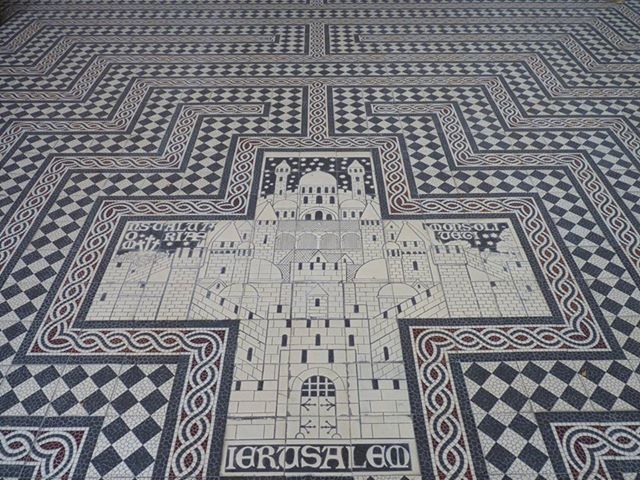
labyrinth in the St Servaas Basilica at Maastricht in the Netherlands via https://www.facebook.com/LabyrinthosUK
Read this in the New Zealand Prayer Book this morning:
God our creator,
yours is the morning and yours is the evening.
Let Christ the sun of righteousness
shine for ever in our hearts
and draw us to that light
where you live in radiant glory.
We ask this for the sake of Jesus Christ our Redeemer.
—————————————-
Breathe in peace,
Let it fill every fibre of your being.
Breathe in love,
Let it fill your heart and soothe your soul.
Breathe in life,
Let if fil your spirit and bring you wholeness.
Breathe in all that is of God,
Let it encircle you.
Behind, before, above, beneath, on right and left,
Let God’s embrace fill you and keep you,
This day and through all eternity.
Amen
Christine Sine https://godspacelight.com/
Lord your redemption overflows.
Like streams in a sun scorched land,
It soaks into our souls.
Like water that cascades in the mountains,
It quenches our thirst.
It blesses our lives,
with your unfailing love and righteousness,
and stirs our passion for justice and mercy.
May we bathe in its never ending flow.
And be washed clean by its holiness.
Christine Sine https://godspacelight.com/
Creator God, who loves us
more than we can know,
who has chosen us
to be family,
we praise your holy name.
Jesus Christ, Son of God,
Word become flesh
dwelling among us,
sacrificed for us,
we praise your holy name.
Holy Spirit, breath of Life,
power within us
from the moment
we first believed,
we praise your holy name.
(http://www.facebook.com/faithandworship?
God you have called us into freedom,
May we use it to follow you with our whole hearts,
May we use it to serve one another in love,
May we use it to grow your eternal world of peace and wholeness for all.
Christine Sine https://godspacelight.com/
Lord Jesus Christ
our joy and our salvation,
our strength and our song,
lead us into your ways.
Let your words bubble up from within us,
Let them overflow in praise and worship,
Let them reach out to touch our neighbours.
Fill us with grace,
Fill us with mercy,
Fill us with justice.
Amen
Christine Sine https://godspacelight.com/
As an Amazon Associate, I receive a small amount for purchases made through appropriate links.
Thank you for supporting Godspace in this way.
When referencing or quoting Godspace Light, please be sure to include the Author (Christine Sine unless otherwise noted), the Title of the article or resource, the Source link where appropriate, and ©Godspacelight.com. Thank you!


